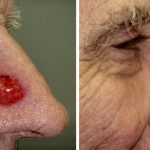A Simple Cream for Cancer with Not Always Simple Consequences
HISTORY
A 62-year-old woman presents with multiple hypopigmented areas of previous skin cancer treatment with imiquimod.
DISCUSSION
Some patients find themselves with a large number of skin cancers and pre-cancerous lesions. While surgical excision is recommended for certain types of skin cancer, pre-cancers and superficial skin cancers can often be treated in other ways. These non-surgical options are often ideal for patients with many lesions who want to limit the number of surgical procedures.

One option is topical therapy. The two most common topical therapies are 5-fluorouracil, commonly known as 5-FU, and imiquimod, brand name Aldara. 5-FU is considered a “chemo cream” that kills cancer cells and prevents their spread. Imiquimod triggers the body’s own immune system to fight the pre-cancerous and cancerous cells. A typical treatment course involves topically applying a cream to the affected area for 2-3 weeks on a precancerous region or 2-3 months for a superficial cancerous lesion. The area usually flares up with redness, peeling, and occasionally scabbing or oozing. The skin typically normalizes after finishing treatment.
However, occasionally the skin does not completely normalize. In the case of our 62 y/o patient, she was left with hypopigmented, light patches across her shoulders and arms. The patches were even more evident due to her tanned skin from frequent swimming. Unfortunately, there are few treatment options for hypopigmentation. Likely, hers is post-inflammatory and may improve over time. However, she is left with the consequences of a “simple chemo cream” until then.
It is important to remember that topical therapies usually do not have lasting cosmetic effects. The best way to prevent consequences is to make sure you are a good candidate for this type of treatment by reviewing the options with your provider. If you are prescribed the medication, at SCARS Center we will follow up with you every few weeks. To make it more convenient, we check-in through video conferencing and/or photos and phone calls. We avoid “prescribe and forget” medicine to prevent side effects as much as possible.

